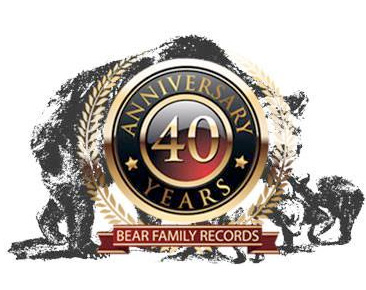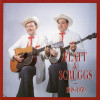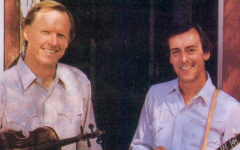
 2015 has marked the 40th anniversary of Bear Family Records, the German-based outlet that is famous for its quality and most-often lavish sets of premium bluegrass and country music recordings.
2015 has marked the 40th anniversary of Bear Family Records, the German-based outlet that is famous for its quality and most-often lavish sets of premium bluegrass and country music recordings.
Essentially, Bear Family Records is Richard Weize. It is his pursuit of excellence that makes the label what it is; the premier record label specializing in re-issue material, much of it rare.
Weize was born on August 4, 1945, in Bad Gandersheim, in southern Lower Saxony where his family had a book store. They instilled in him a love of books and the importance of looking after them.
As a 15 year old he displayed his entrepreneurial traits by ordering records from an American wholesaler using the book store’s letterhead, and sold them with a small mark-up enabling him to keep one copy for every 12 that he sold. This small margin ensured that his collection quickly grew to several hundred records.
Although Weize didn’t live close enough to listen to the music broadcast by the American Forces Radio from the military bases that proliferated West Germany in the post-World War II era, he had friends that did and they told him about new American releases.
 Passionate about music, he started to write articles for German fan magazines and European music magazines for record collectors.
Passionate about music, he started to write articles for German fan magazines and European music magazines for record collectors.
To fund his next business venture Weize sold his sizable record collection and went into the wine-selling business.
Although his English was rudimentary, in 1966 he moved to England.
Bill Clifton recalls ….
“I met Richard Weize very shortly after I returned to England from the Philippines (after completing three long years as an Administrator for the U.S. Peace Corps) in 1970. At the time, Richard was a sales representative for a German wine company. His job was to sell large case lots to an extensive list of wealthy clients, the names and addresses of whom were supplied to him by the company for whom he worked.
My first impression: Exceptionally intelligent young man with a very keen interest in American country music. And it’s various branches and offshoots.”
British roots music enthusiast John Atkins knew Weize when he lived in the UK, “He was a tall blonde German, fitting the stereotype …”
Weize’s friend Walter Fuchs remembers the successful former German wine-seller from that time also, “When I met Richard in England, he was wearing a dark suit and tie and was clean shaven.” Fuchs adds, “He is not so clean-cut now, with a beard, jeans and military parka, baseball cap being his choice of attire today.”
During the Easter weekend of 1969 Weize attended the first Wembley (London) Country Music Festival and his love for country music was instantly re-kindled.
In 1971 he returned to Germany and a little while later Weize started the Folk Variety label with a friend, and booked U.S. folk acts, some of whom he also recorded.
The first two Folk Variety releases appeared in 1972, featuring various artists playing folk and bluegrass music at the Neusudende country music festivals near Oldenburg, Germany. In 1974 Weize released a joint effort by Bill Clifton and Hedy West, Getting Folk out of the Country. During the following year he released Bluegrass Session, 1952 by Bill Clifton and Paul Clayton.
When his partner decided to go into politics, Weize decided to start a mail-order business selling records.
In 1975, using a US $1,000 overdraft, he started Bear Family Records.
Given his earlier association with Bill Clifton, it was quite natural for Weize to work with Clifton for Bear Family’s premiere album. The two-LP set Going Back To Dixie features recordings that Clifton made for Starday between 1963 and 1966 with instrumental and vocal support from the Country Gentlemen, Mike Seeger, and Roy and Paul Justice. “At the time Clifton had a name that was well known in Europe,” Weize said. “I also did the booking for him in Germany.”
There was a slow trickle of LP releases during the next 15 years – three more involving Bill Clifton, one of which was Are you from Dixie? with Red Rector; two albums featuring the music of the Maddox Brothers & Rose; and a Jimmie Skinner record.
 However, with the advent of the CD, there was a widespread program concentrated on re-issued material. About 20 albums were released during the period 1989 to 1995, with artists such as Bill Monroe (Blue Grass 1950-1958, BCD 15423, 1989, Blue Grass 1959-1969, BCD 15529, 1991, Blue Grass 1970-1979, BCD 15606, 1994); Flatt & Scruggs (Flatt & Scruggs, 1948-1959, BCD 15472, 1991, Flatt & Scruggs, 1959-1963, BCD 15559, 1992, Flatt & Scruggs, 1964-1969, BCD 15879, 1995); the Stanley Brothers (The Stanley Brothers & the Clinch Mountain Boys, 1949-52, BCD 15564, 1991, The Stanley Brothers & the Clinch Mountain Boys, 1953-1958 & 1959, BCD 15681, 1993); Jim & Jesse (Jim & Jesse, 1952-1955, BCD 15635, 1993, Bluegrass and More, BCD 15716, 1993); The Osborne Brothers (The Osborne Brothers, 1956-1968, BCD 15598, 1995, The Osborne Brothers 1968-1974, BCD 15748, 1995); Jimmy Martin (Jimmy Martin & his Sunny Mountain Boys, BCD 15705, 1994); the Lonesome Pine Fiddlers (Windy Mountain ECD 501, 1992) and Hylo Brown (Hylo Brown & his Timberliners 1954-1960, BCD 15572, 1992) all represented.
However, with the advent of the CD, there was a widespread program concentrated on re-issued material. About 20 albums were released during the period 1989 to 1995, with artists such as Bill Monroe (Blue Grass 1950-1958, BCD 15423, 1989, Blue Grass 1959-1969, BCD 15529, 1991, Blue Grass 1970-1979, BCD 15606, 1994); Flatt & Scruggs (Flatt & Scruggs, 1948-1959, BCD 15472, 1991, Flatt & Scruggs, 1959-1963, BCD 15559, 1992, Flatt & Scruggs, 1964-1969, BCD 15879, 1995); the Stanley Brothers (The Stanley Brothers & the Clinch Mountain Boys, 1949-52, BCD 15564, 1991, The Stanley Brothers & the Clinch Mountain Boys, 1953-1958 & 1959, BCD 15681, 1993); Jim & Jesse (Jim & Jesse, 1952-1955, BCD 15635, 1993, Bluegrass and More, BCD 15716, 1993); The Osborne Brothers (The Osborne Brothers, 1956-1968, BCD 15598, 1995, The Osborne Brothers 1968-1974, BCD 15748, 1995); Jimmy Martin (Jimmy Martin & his Sunny Mountain Boys, BCD 15705, 1994); the Lonesome Pine Fiddlers (Windy Mountain ECD 501, 1992) and Hylo Brown (Hylo Brown & his Timberliners 1954-1960, BCD 15572, 1992) all represented.
Among those were the first of the illustrious box sets. “Box sets became more important when CDs came …… we put big books inside with large pictures and the history of the artist and the songs,” Weize explained.
Since then bluegrass releases include Jim Eanes, Jim Eanes & the Shenandoah Valley Boys (BCD 15934, 1999), Bill Clifton Around the World to Poor Valley (BCD 16425, 2001), Bill Monroe & Lester Flatt Live at Vanderbilt (BCD 16614, 2002), Blue Sky Boys, The Sunny Side of Life (BCD 15951, 2003), Bill Monroe & his Blue Grass Boys, Blue Moon of Kentucky: 1936-1949 (BCD 16399, 2003), Don Reno, Red Smiley & the Tennessee Cutups, Sweethearts in Heaven (BCD 16728, 2004), Carl Story & his Rambling Mountaineers, Lonesome Hearted Blues (BCD 16689, 2005), Bill Monroe & his Blue Grass Boys, My Last Days on Earth: Bluegrass, 1981-1984 (BCD 16637, 2007), Wilma Lee & Stoney Cooper, Big Midnight Special (BCD 16751, 2007) and Charlie Monroe, I’m Old Kentucky Bound (BCD 16808, 2007).
The most recent bluegrass releases from Bear Family Records include the wonderful box-set (4 CDs) Carl Story & the Rambling Mountaineers, Bluegrass, Gospel and Mountain Music 1942-1959 (BCD 16839, 2011).
In August 2012 Bear Family Records released two collections of the Bailes Brothers’ King material, the 1946 recordings (Remember Me, The Legendary King Sessions 1946, BCD 17132) being particularly notable.
 All of these and more led to Weize earning several awards. In 2003, the German Music Critics’ Award was presented to Richard Weize for his innovative use of sound carriers. In 2005, the Country Music Association in Nashville, Tennessee, recognized Bear Family Records on their 30th Anniversary for their contribution to the preservation of country music.
All of these and more led to Weize earning several awards. In 2003, the German Music Critics’ Award was presented to Richard Weize for his innovative use of sound carriers. In 2005, the Country Music Association in Nashville, Tennessee, recognized Bear Family Records on their 30th Anniversary for their contribution to the preservation of country music.
In 2006, Nashville, Tennessee’s The Mike Curb College of Entertainment and Music Business at Belmont University, presented a Lifetime Achievement Award to Richard Weize, in recognition of a lifetime spent linking research to country music. Then in May 2007 Richard Weize of Bear Family Records in Germany received the “Lifetime Achievement” award for “linking books with country music,” presented at the 24th Annual International Country Music Conference held at Belmont University in Nashville. This award honored Weize for his thirty-year endeavors in furthering world-wide awareness of country music.
In February 2009 Weize received the ECHO Honour Award for Bear Family Records’ Special Services to Music. The ECHO Awards are the German music industry’s equivalent of the Grammies.
In 2010 he was presented with the IBMA’s Distinguished Achievement Award.
Reflecting on the acclaim, Richard Weize says that all the awards and the achievements leading to them would not have been possible without the unselfish support of countless authors, licensors, artists, experts, collectors, designers, illustrators, sound engineers, distribution partners, record store owners, journalists, deejays and TV hosts. “Thanks must go to the contribution of Bear Family Records’ staff members.” Above all, Weize would like to express his deepest gratitude to the music fans who continue to buy his releases.
Weize is blessed with great persistence, single-mindedness, “He can be very stubborn, but in the end he gets what he wants,” Walter Fuchs attests. His diligence and search for quality leads him to spend three or four months a year on the road, personally overseeing the transfer of music from tapes to make sure he is getting the best available. “He does take incredible trouble in getting things right,” agrees Fuchs. For that we can be very thankful.
Additionally, “Richard always had a special feeling and knowledge for what and who was important in the development of music.” Weize, 60, likes to say he was born with a sense of history. The foundation of his family house near Braunschweig, Germany, was built in 850 and that, allied to being surrounded by rare, old books, brings some substance to the influences in Weize’s early years.
Banjo player, historian and collector Tom Adler adds, “The quality of both the audio product and its supporting documentary materials are usually superb.”
Weize is a fanatic, a collector. Sometimes he thought he only founded Bear Family Records to increase the possibility of building up his huge collection of records. Often he told me, “I only released this LP or CD just to have it in my collection no matter how good or how bad it sold,” Fuchs reveals. “My aim is not primarily about the money, as long as I can live reasonably.”
 “If Richard Weize is working on a project, he will turn 16 hours a day, 7 days a week until [he] eliminate[s] ambiguity, the last sound from the sound engineer is processed.”
“If Richard Weize is working on a project, he will turn 16 hours a day, 7 days a week until [he] eliminate[s] ambiguity, the last sound from the sound engineer is processed.”
Those efforts are certainly much appreciated. Bluegrass historian Neil V. Rosenberg cites “the completeness of the sets; the inclusion of discographical data in the notes; and the very good quality of the re-mastering” as being of significant value to collectors.
Weize has employed the best historians and chroniclers of the music to provide notes about an artist’s career.
One of those experts himself, Rosenberg, notes that Weize’s work is not just limited to what goes into the Bear Family releases. It has wider significance, “Without the work that Richard Weize did to get the Monroe recordings reissued, Charles Wolfe and I would not have been able to do what we did on our book for the University of Illinois Press, The Music of Bill Monroe. His research has been invaluable for anyone interested in the history of bluegrass and country music.”
With typical modesty, Weize reflects, “I really have no particular thoughts after 40 years except that there is a lot of material that I have issued on Bear Family.”
As for the future, he concludes, “at this point I have nothing planned in the way of bluegrass”.
Those of us who love and wish to remember the wonderful music of our first generation of bluegrass artists will forever be grateful for his work.







